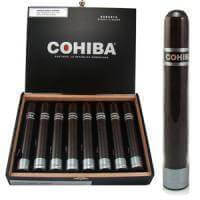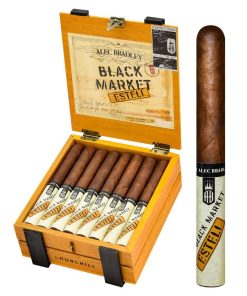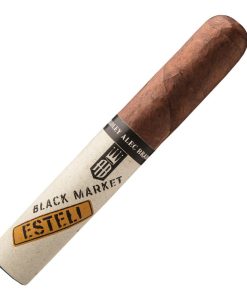RYO LifeStyle Blog
Why Are Cuban Cigars Illegal?
Importing Cuban cigars for commercial and personal purposes is illegal in the United States. This ban is not related to the contents of these tobacco products but to the unstable political relationship between the United States and Cuba.
Firstly, this article explains why Cuban cigars are illegal in the US, the history of Fidel Castro, and American officials. Then, it explores how sanctions against Cuba have changed in the last decade. Finally, it examines the options Cuban cigar lovers have in the present and answers the frequently asked questions.
Why The US Banned Cuban Cigars?
The United States prohibited Cuban cigars due to the strict trade embargo on all imports of Cuban products. The prohibition was implemented in February 1962 by President John F Kennedy against Fidel Castro’s socialist regime in Cuba.
The purpose of the embargo has been to weaken Fidel Castro’s Communist regime and his power during the Cold War. It came as a reaction when Cuba became close to the US’ biggest geopolitical enemy, Russia. Sanctions were reasonably severe, and so were the penalties for lawbreakers. For example, the fine for smuggling a Cuban cigar in the US could have been around $55,000.

Fidel Castro And The Cuban Missile Crisis
Fidel Castro’s rise to power has been the reason for the cigar ban. “El Caballo”, as native Cubans addressed him, was a firm believer in Marxism who sought to further it in Cuba. Fidel finally obtained power by becoming Prime Minister on February 16th, 1959. He then seized businesses and land owned by foreigners and Cuban citizens.
Castro disdained the US. For him, the US was an imperialist country. Moreover, he disliked US president Dwight Eisenhower and vice president Richard Nixon. The tensions between the US and Cuba reached an all-time height during the “Cuban Missile Crisis” in October 1962. Then, it was a 13-day standoff between the US and the Soviet Union.
The clash began when the US found out the U.S.S.R. had placed ballistic missiles in Cuba. At that time, the risk of nuclear war was highest. John F. Kennedy placed the embargo in 1962, restricting goods of Cuban origin regardless of whether manufactured inside or outside of Cuba.
Before signing the executive order, Kennedy asked one of his officials, Pierre Salinger, to bring him 1000 H. Upmann cigars from Cuba, a soon-to-be-rare commodity. He then announced that Cuban cigars had become illegal contraband. People believed that officials would remove the ban after Fidel Castro’s death, but it didn’t happen. The trade embargo with Cuba is associated with six primary statutes:
- Trading with the Enemy Act of 1917 – banning arms trading
- Foreign Assistance Act of 1961 – which maintains the ban unless movement toward democratization
- Cuban Assets Control Regulations of 1963 – domestic embargo enforcement
- Cuban Democracy Act of 1992 – sanctions aimed toward a peaceful transition to democracy
- Helms-Burton Act of 1996 – an extension of the ban to countries that trade with Cuba
- Trade Sanctions Reform and Export Enhancement Act of 2000

Changing Rules For Cuban Cigars
Obama’s administration has worked towards repairing relations with Cuba by lessening some of the restrictions. In December 2014, Obama eased the requirements of the trade embargo by allowing travelers to return to the US with up to $100 worth of Cuban cigars if they were for personal use rather than for commercial purposes.
Moreover, in October 2016, Obama further lifted the US trade embargo for any cigars brought from Cuba for personal consumption. However, people would generally avoid bringing more than $2500 worth of goods since such commercial imports required formal declaration. Over this level, individuals would look as if they purchased cigars for reselling.
Then, in 2020, Donald Trump tightened the requirements of the embargo once more. The importation of Cuban cigars became prohibited again for Americans coming from Cuba or any countries such as Mexico and Canada who traded freely with Cuba.
Another significant restriction has been the “Cuba Prohibited Accommodations List” established by the US State Department. It contains a list of names and addresses of hotel properties in Cuba where Americans are not allowed to do business, for example, book a room. As the regulation suggests, these properties are either owned or controlled by the Cuban government.
This rule has limited access to more than 400 hotels, including the most popular ones. Travelers need to rely on private accommodation through apps like Airbnb instead. Therefore, strict regulation has discouraged American Cuban cigar lovers from attending the most popular festivals such as Habanos Festival and Havana Jaz Festival.
Cigar lovers were, therefore, happiest between 2014 and 2019 as they could finally smoke a proper Cuban roll of tobacco. But unfortunately, there is no sign that the situation will improve soon.

The Effectiveness Of The Embargo And Parallel Brands In The US
Whether regulations can change while Cuba is still a communist country is debatable. While the world has changed significantly since 1962, Cuba has not.
Although the United States may trade with other communist countries like China, Cuba is different because it is the only communist country within 90 miles of the US. Nevertheless, a big group of political Cubans who have moved to South Florida still argue against Castro’s decisions during his rule and continue to favor the embargo.
Some individuals may say that the blockade is ineffective since Cuba’s citizens bear the economic burden. Therefore, lawmakers need to decide whether they should allow Americans to help the Cuban people by supporting their economy and buying their products.
On the other side, people argue the embargo should continue until Cuba establishes a democratic government and returns confiscated private property. With their farmland confiscated, the Cuban tobacco industry leaders left their country to create parallel brands. They established their tobacco plantations and factories again in the US, Miami, and in Central America.
The original Cuban owners have been legally allowed to sell non-Cuban versions of their cigars under the original brand name they had built in Cuba. However, the parallel brands sell only in the United States, where Cuban cigars can’t compete due to the embargo. For example, multiple cigar brands such as Montecristo, Partagas, and Romeo y Julieta have identical names.
Regardless, cigar lovers have been exploring ways to access authentic Cuban cigars for decades. Unfortunately, some have attempted to bring Cuban cigars from the UK back into the UK and have faced penalties. A USA Today poll in 2008 revealed that 61% of Americans consider that the US should re-engage with Cuba. However, the best solution and safest ones have been to stick to enjoying cigars while in Cuba.
SHOP CIGARSFAQs
What Happens If Authorities Catch Someone Smuggling A Cuban Cigar?
Even though the US has forbidden Cuban cigars, some still try to sneak them in. Such an act is a criminal offense and has harsh consequences. Any traveler caught with Cuban cigars, whether for resale or personal consumption, can face punishment in the US. Penalties vary depending on the severity of each case. It can range from seizing the products or a fine to a criminal case.
Can Someone Buy Cuban Cigars Online In The US In 2022?
An online search might reveal that ordering authentic Cuban cigars is possible. However, the commercial import of cigars is illegal in the US. Perhaps some online shops have not updated their website info yet to include the latest regulation changes. The person making the order also risks paying for a package that would never arrive.
What Is The Latest Regulation In Place?
While Cuban cigars for personal consumption were made legal in 2014, all Cuban imports, such as cigars, were banned again in September 2020. This ban means travelers cannot bring Cuban cigars to the US, even for personal consumption.
Takeaways
Cuban cigars are still illegal in the US due to the trade embargo started during Fidel Castro’s administration of communist Cuba. While people expected the sanctions to disappear after Fidel’s passing, American lawmakers are likely to await the democratization of Cuba before resuming healthy economic relations.
The American government is cautious because Cuba is the closest communist state geographically and has already proved that it can pose a significant security risk during the Cuban Missile Crisis.
Given the recent tightening of the trade embargo by President Trump, Americans who enjoy Cuban cigars should have their “sticks” while abroad. They should avoid seeking loopholes and ensure they are not committing a grave offense by importing Cuban cigars. Such action could risk them significant fines and criminal punishments. Finally, US citizens can enjoy parallel brands domestically as substitutes for the ones manufactured in Cuba.







